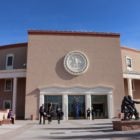We are digesting the news this week that investigators at the Attorney General’s office suspect Democratic House Majority Leader Sheryl Williams Stapleton of Albuquerque funneled almost a million dollars of public money out of Albuquerque Public Schools, her employer, to benefit herself.
To learn that a trusted champion of under-served communities and one of the most powerful lawmakers in the state may have orchestrated a long-running scheme to grab a slice of public money for herself, is sad news. We are holding out hope that it’s not true, not one more tragic episode in the annals of corrupt New Mexico leaders. The investigation is laid out in a 32-page search warrant, centered on discoveries of money from a company with a sole source contract with the school district going to organizations or businesses she appears to have substantial control over.
Buried among the details in the damning search warrant is $50,000 in state capital outlay money that in 2007 Williams Stapleton directed to the New Mexico Office of African American Affairs to purchase and equip vans for the African American Performing Arts Center at the State Fairgrounds in Albuquerque. In a 2008 email between Williams Stapleton and Expo New Mexico, she explained the vans were for programs at the center. Their upkeep would be the responsibility of the Charlie Morrisey Education Center and a company called Robotics Learning Management Systems.
The search warrant makes the case that the Charlie Morrisey Education Center is an organization that Stapleton had substantial influence over, and that she directed capital outlay money to it.






